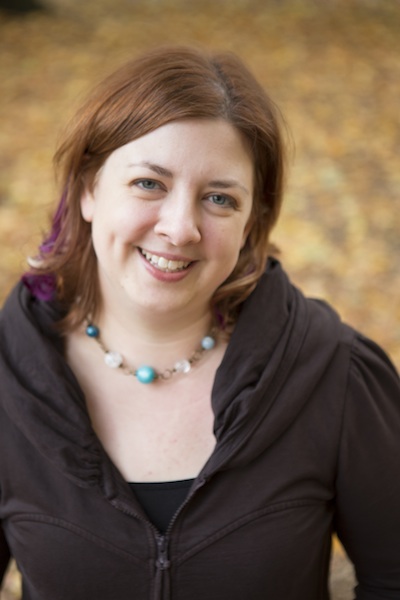Three Lessons on Writing (In The Word Cellar)
 Tuesday, July 13, 2010 at 8:59PM
Tuesday, July 13, 2010 at 8:59PM 
I just started the third semester of my MFA program. Here's some of what I've learned so far. (And scroll down for a giveaway!)
Lesson One: Write with your body
At my first on-campus residency last summer, I realized that I'd been writing almost completely from my head. I'd been ignoring the five senses on the page, writing about my observations and interior life nearly devoid of sight, smell, taste, touch, and sound. When I heard people read work that mesmerized me, I realized that they were describing things in the physical world. Fancy that!
This simple concept revolutionized my writing. I started writing not just with my head, but with my eyes, nose, mouth, skin, and ears. I discovered a lyric writing voice I'd never suspected I had -- or that I'd even wanted. I fell in love with this new way of writing down the world.
Lesson Two: Choose your own story (and your voice)
By my second residency last winter, I was practicing my new voice and playing around with various writing styles and topics. I'd written a few lyric essays that were related to each other, but I didn't have a real direction with my work. When I realized that I'd need at least 75 pages for a final collection in order to graduate, I panicked. Those 75 pages didn't have to be related, but wouldn't it be nice if they were? It was time to choose a direction.
On top of it all, my advisors were encouraging me to write about a true story from my life that I did not want to write. "I'm just not interested in telling that story," I'd say.
They'd counter with: "But there's so much good stuff in there!"
I knew they were right: There is good stuff in there. And I knew I wanted a cohesive collection of 75 pages for my portfolio. So I started writing that story. I wrote 30 pages. I hated most of them. I hated the process of telling that particular story in that particular way.
But I'm so glad that my advisors encouraged me to try it, because those 30 pages showed me exactly what I didn't want to write, which finally illuminated what I did want to write.
I realized that my lyric essays had been trying to tell a similar story as those pages of memoir, but I hadn't seen it until I took a detour. By showing me what I didn't want to do, those 30 pages illuminated the story I did want to tell and how I wanted to tell it.
The only way to keep writing (and to keep making art of any kind) is to be true to our creative visions, to honor our passions and quirks. Sometimes it takes a detour to show us our true path. That's just part of the process.
In the end, you get to choose the story you tell, and how you tell it.
Lesson Three: Let the writing take over
I got back from my third residency last week. While I was there, the message all around me was this: Go deeper. Be wilder. Let the writing take over. Stop worrying about appearing normal to other people.
Within a few days of receiving this message from the universe, the first challenge to it smacked me in the chest and sent me to my knees. Circumstances conspired to make this going deeper and being wilder seem too risky. I contemplated scrapping my soul-baring lyric essays and instead writing about coffee or kittens -- anything to avoid letting the writing take over. Anything to avoid telling my story in my voice. Anything to avoid going deeper.
For two days I cried to friends and teared up when anyone asked me how I was. I looked for loopholes, tangents, escape routes -- anything to avoid the work of my artistic calling: to be true, no matter the consequences (real or imagined).
I don't know what going deeper and wilder will look like. I'm excited and afraid. I'm also utterly convinced that there is no other way forward.
* * *
Giveaway
Ask a writing question. Be entered to win a copy of Lanterns.
For the rest of July, anyone who emails me a writing question or leaves one in the comment will be entered to win a copy of Lanterns: A Gathering of Stories. I'll choose the winner randomly, and there's no limit to how many questions you can ask.
Leave your questions in the comments of this post or email them to jennifer{at}thewordcellar{dot}com. Small questions and big ones. Vague questions and the very specific. Questions on the writing life, the writing process, and the craft of writing. Send them all!
In The Word Cellar runs on the second and fourth Wednesday of the month. Read other posts in the series here.
 in the word cellar,
in the word cellar,  writing,
writing,  writing life,
writing life,  writing tips
writing tips 



